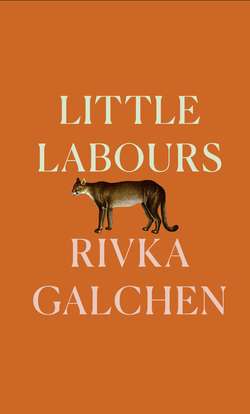Читать книгу Little Labours - Rivka Galchen - Страница 8
A reason to apologize to friends
ОглавлениеAll of the items pertaining to the baby are kept in a three-shelved metal cabinet in the bathroom. The cabinet is a sturdy item ordered from an industrial products catalog that also sells Hazard labels in bulk. On the top shelf of the cabinet, still out of the baby’s reach, are diapers, crib sheets, and for no particular reason, the baby’s socks. On the middle shelf of the cabinet are the baby’s clothes, which are there in reasonably neatly folded piles of tops, bottoms, sweaters, and onesies. Then on the lowest shelf is whatever: hand-me-down shoes still too large, bibs never used, a swimsuit, a curling iron, too-small clothes not yet given away, and so on. But I keep the middle shelf orderly; a fair amount of effort goes into this; the orderliness of the middle shelf is a fragile, essential dam against the deluge. But the baby loves to disorder the shelves. She can’t yet walk or even crawl, instead she uses her arms to heave-ho her legs forward—we call this her wounded-deer maneuver—and whenever the bathroom door is left open, she hurries (in her way) over to the cabinet and then steadily and joyfully dedicates herself to unshelving all the reachable objects, into making heaps. She is so, so happy when she does this. So happy. It is more happiness, and stuff, than one thought the cabinet could contain.
I didn’t want to keep my wounded deer from her joy. But not keeping her from her joy meant that, at a later moment, usually during her rare naps, I had to go in and refold and reshelve the piles of clothes, a task that reminded me of an old Russian formalist text that baffled me when I was a college student, a text that I recall as being straightforward, and serious, and that argued for doing away with housework, since what was the point of housework, it produced nothing, it was done and then simply was started all over again, it should be abolished. Maybe that old Russian had a point. Why the shelf contained all these anxieties, I don’t know, but it did. For me, it was the most important and symbolic space in the home. I was still trying to work other nonhousework, non-young-person-care jobs, but these attempts to work were not going well. Occasionally these things not going well combined with my general sense of being trapped inside a space that the Russian formalist of days past would have described as producing nothing and I would feel like I was turning into sand and would soon be nothing but a dispersed irritant. And so one day I decide that I will at least try to talk things over with the still-wordless wounded deer. She makes her dash toward the cabinet. I follow her. I ask her if maybe she might consider leaving the second shelf of the cabinet, the shelf with all the folded clothes on it, alone; I ask her if she would consider unshelving items only from the lowest, already disorderly, shelf. I explain to her that if she could alter her behavior in this small way, it would mean not half as much reshelving work for me, but one-tenth as much. It would be really, really nice for me, I explain. And she understands! She begins to leave the second shelf of temptingly tidily folded stacks of clothing alone. Even when unsupervised! And after that I—I tell this anecdote to friends who will listen, as if it is interesting.
